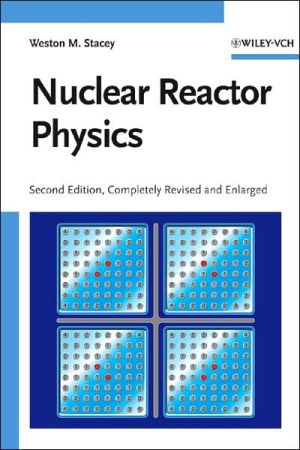

 |

|

Sold Out
Book Categories |
PREFACE.
PART 1: BASIC REACTOR PHYSICS.
1. Neutron Nuclear Reactions.
1.1. Neutron-Induced Nuclear Fission.
1.2. Neutron Capture.
1.3. Neutron Elastic Scattering.
1.4. Summary of Cross-Section Data.
1.5. Evaluated Nuclear Data Files.
1.6. Elastic Scattering Kinematics.
2. Neutron Chain Fission Reactors.
2.1. Neutron Chain Fission Reactions.
2.2. Criticality.
2.3. Time Dependence of a Neutron Fission Chain Assembly.
2.4. Classification of Nuclear Reactors.
3. Neutron Diffusion Theory.
3.1. Derivation of One-Speed Diffusion Theory.
3.2. Solutions of the Neutron Diffusion Equation in Nonmultiplying Media.
3.3. Diffusion Kernels and Distributed Sources in a Homogeneous Medium.
3.4. Albedo Boundary Condition.
3.5. Neutron Diffusion and Migration Lengths.
3.6. Bare Homogeneous Reactor.
3.7. Reflected Reactor.
3.8. Homogenization of a Heterogeneous Fuel-Moderator Assembly.
3.9. Control Rods.
3.10. Numerical Solution of Diffusion Equation.
3.11. Nodal Approximation.
4. Neutron Energy Distribution.
4.1. Analytical Solutions in an Infinite Medium.
4.2. Multigroup Calculation of Neutron Energy Distribution in an Infinite Medium.
4.3. Resonance Absorption.
4.4. Multigroup Diffusion Theory.
5. Nuclear Reactor Dynamics.
5.1. Delayed Fission Neutrons.
5.2. Point Kinetics Equations.
5.3. Period-Reactivity Relations.
5.4. Approximate Solutions of the Point Neutron Kinetics Equations.
5.5. Delayed Neutron Kernel and Zero-Power Transfer Function.
5.6. Experimental Determination of Neutron Kinetics Parameters.
5.7. Reactivity Feedback.
5.8. Perturbation Theory Evaluation of ReactivityTemperature Coefficient.
5.9. Reactor Stability.
5.10. Measurement of Reactor Transfer Functions.
5.11. Reactor Transients with Feedback.
5.12. Reactor Fast Excursions.
5.13. Numerical Methods.
6. Fuel Burnup.
6.1. Changes in Fuel Composition.
6.2. Samarium and Xenon.
6.3. Fertile-to-Fissile Conversion and Breeding.
6.4. Simple Model of Fuel Depletion.
6.5. Fuel Reprocessing and Recycling.
6.6. Radioactive Waste.
6.7. Burning Surplus Weapons-Grade Uranium and Plutonium.
6.8. Total Energy Extraction.
6.9. Transmutation of Spent Nuclear Fuel.
7. Nuclear Power Reactors.
7.1. Pressurized Water Reactors.
7.2. Boiling Water Reactors.
7.3. Pressure Tube Heavy Water-Moderated Reactors.
7.4. Pressure Tube Graphite-Moderated Reactors.
7.5. Graphite Moderated Gas-Cooled Reactors.
7.6. Liquid-Metal Fast Breeder Reactors.
7.7. Other Power Reactors.
7.8. Characteristics of Power Reactors.
7.9. Advanced Reactors.
7.10. Nuclear Reactor Analysis.
7.11. Interaction of Reactor Physics and Reactor Thermal Hydraulics.
8. Reactor Safety.
8.1. Elements of Reactor Safety.
8.2. Reactor Safety Analysis.
8.3. Quantitative Risk Assessment.
8.4. Reactor Accidents.
8.5. Passive Safety.
PART 2: ADVANCED REACTOR PHYSICS.
9. Neutron Transport Theory.
9.1. Neutron Transport Equation.
9.2. Integral Transport Theory.
9.3. Collision Probability Methods.
9.4. Interface Current Methods in Slab Geometry.
9.5. Multidimensional Interface Current Methods.
9.6. Spherical Harmonics (PL) Methods in One-Dimensional Geometries.
9.7. Multidimensional Spherical Harmonics (PL) Transport Theory.
9.8. Discrete Ordinates Methods in One-Dimensional Slab Geometry.
9.9. Discrete Ordinates Methods in One-Dimensional Spherical Geometry.
9.10. Multidimensional Discrete Ordinates Methods.
9.11. Even-Parity Transport Formulation.
9.12. Monte Carlo Methods.
10. Neutron Slowing Down.
10.1. Elastic Scattering Transfer Function.
10.2. P1 and B1 Slowing-Down Equations.
10.3. Diffusion Theory.
10.4. Continuous Slowing-Down Theory.
10.5. Multigroup Discrete Ordinates Transport Theory.
11. Resonance Absorption.
11.1. Resonance Cross Sections.
11.2. Widely Spaced Single-Level Resonances in a Heterogeneous Fuel-Moderator Lattice.
11.3. Calculation of First-Flight Escape Probabilities.
11.4. Unresolved Resonances.
11.5. Multiband Treatment of Spatially Dependent Self-Shielding.
11.6. Resonance Cross-Section Representations.
12. Neutron Thermalization.
12.1. Double Differential Scattering Cross Section for Thermal Neutrons.
12.2. Neutron Scattering from a Monatomic Maxwellian Gas.
12.3. Thermal Neutron Scattering from Bound Nuclei.
12.4. Calculation of the Thermal Neutron Spectra in Homogeneous Media.
12.5. Calculation of Thermal Neutron Energy Spectra in Heterogeneous Lattices.
12.6. Pulsed Neutron Thermalization.
13. Perturbation and Variational Methods.
13.1. Perturbation Theory Reactivity Estimate.
13.2. Adjoint Operators and Importance Function.
13.3. Variational/Generalized Perturbation Reactivity Estimate.
13.4. Variational/Generalized Perturbation Theory Estimates of Reaction Rate Ratios in Critical Reactors.
13.5. Variational/Generalized Perturbation Theory Estimates of Reaction Rates.
13.6. Variational Theory.
13.7. Variational Estimate of Intermediate Resonance Integral.
13.8. Heterogeneity Reactivity Effects.
13.9. Variational Derivation of Approximate Equations.
13.10. Variational Even-Parity Transport Approximations.
13.11. Boundary Perturbation Theory.
14. Homogenization.
14.1. Equivalent Homogenized Cross Sections.
14.2. ABH Collision Probability Method.
14.3. Blackness Theory.
14.4. Fuel Assembly Transport Calculations.
14.5. Homogenization Theory.
14.6. Equivalence Homogenization Theory.
14.7. Multiscale Expansion Homogenization Theory.
14.8. Flux Detail Reconstruction.
15. Nodal and Synthesis Methods.
15.1. General Nodal Formalism.
15.2. Conventional Nodal Methods.
15.3. Transverse Integrated Nodal Diffusion Theory Methods.
15.4. Transverse Integrated Nodal Integral Transport Theory Models.
15.5. Transverse Integrated Nodal Discrete Ordinates Method.
15.6. Finite Element Coarse Mesh Methods.
15.7. Variational Discrete Ordinates Nodal Method.
15.8. Variational Principle for Multigroup Diffusion Theory.
15.9. Single-Channel Spatial Synthesis.
15.10. Multichannel Spatial Synthesis.
15.11. Spectral Synthesis.
16. Space-Time Neutron Kinetics.
16.1. Flux Tilts and Delayed Neutron Holdback.
16.2. Spatially Dependent Point Kinetics.
16.3. Time Integration of the Spatial Neutron Flux Distribution.
16.4. Stability.
16.5. Control.
16.6. Xenon Spatial Oscillations.
16.7. Stochastic Kinetics.
Appendix A: Some Useful Nuclear Data.
Appendix B: Some Useful Mathematical Formulas.
Appendix C: Step Functions, Delta Functions, and Other Exotic Beasts.
Appendix D: Some Properties of Special Functions.
Appendix E: Introduction to Matrices and Matrix Algebra.
Appendix F: Introduction to Laplace Transforms.
INDEX.
Login|Complaints|Blog|Games|Digital Media|Souls|Obituary|Contact Us|FAQ
CAN'T FIND WHAT YOU'RE LOOKING FOR? CLICK HERE!!! X
 You must be logged in to add to WishlistX
 This item is in your Wish ListX
 This item is in your CollectionNuclear Reactor Physics
X
 This Item is in Your InventoryNuclear Reactor Physics
X
 You must be logged in to review the productsX
 X
 X

Add Nuclear Reactor Physics, Nuclear reactor physics is the core discipline of nuclear engineering. Nuclear reactors now account for a significant portion of the electrical power generated worldwide, and new power reactors with improved fuel cycles are being developed. At the same ti, Nuclear Reactor Physics to the inventory that you are selling on WonderClubX
 X

Add Nuclear Reactor Physics, Nuclear reactor physics is the core discipline of nuclear engineering. Nuclear reactors now account for a significant portion of the electrical power generated worldwide, and new power reactors with improved fuel cycles are being developed. At the same ti, Nuclear Reactor Physics to your collection on WonderClub |